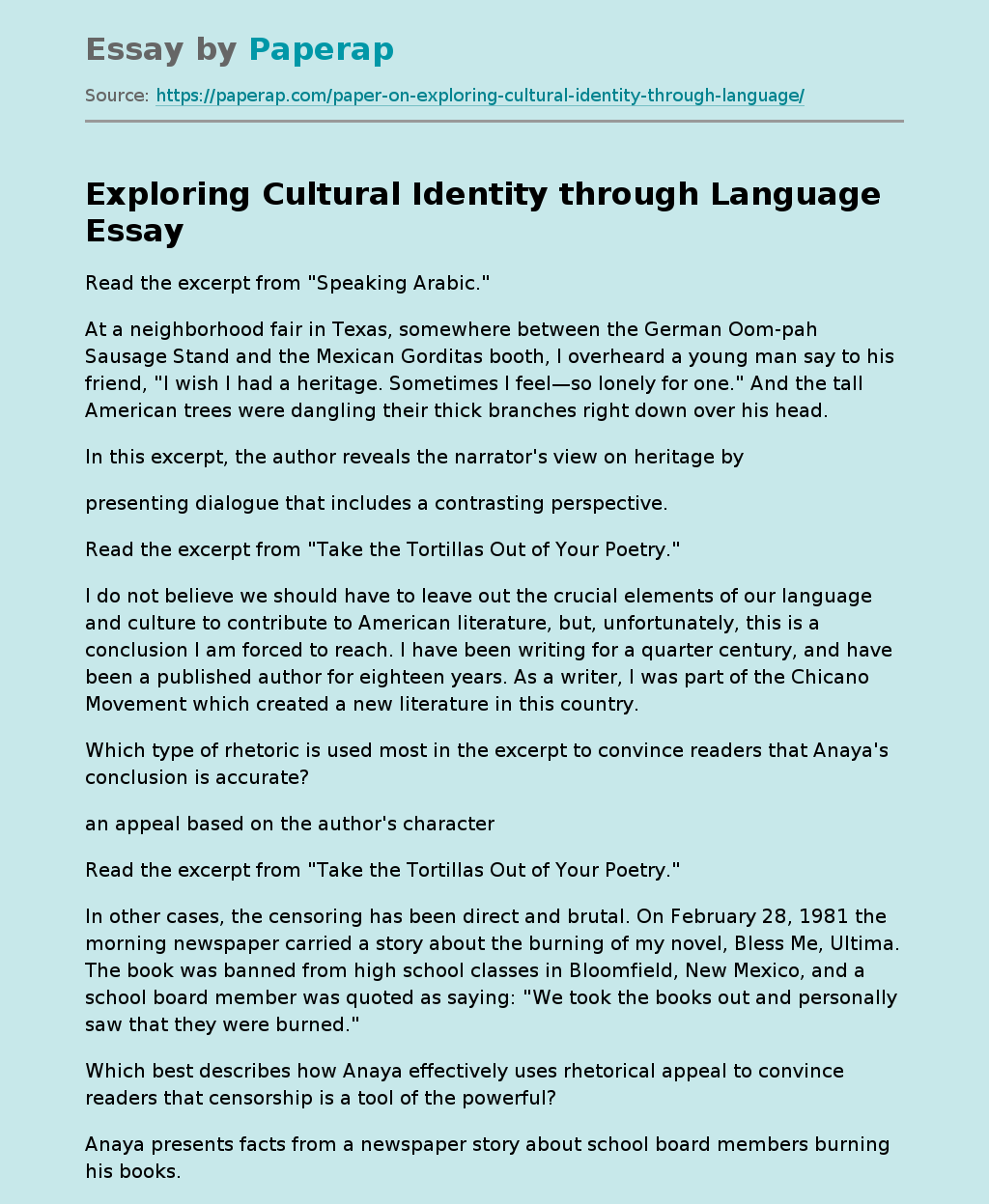Exploring Cultural Identity through Language
At a neighborhood fair in Texas, somewhere between the German Oom-pah Sausage Stand and the Mexican Gorditas booth, I overheard a young man say to his friend, “I wish I had a heritage. Sometimes I feel—so lonely for one.” And the tall American trees were dangling their thick branches right down over his head.
In this excerpt, the author reveals the narrator’s view on heritage by
I do not believe we should have to leave out the crucial elements of our language and culture to contribute to American literature, but, unfortunately, this is a conclusion I am forced to reach. I have been writing for a quarter century, and have been a published author for eighteen years. As a writer, I was part of the Chicano Movement which created a new literature in this country.
Which type of rhetoric is used most in the excerpt to convince readers that Anaya’s conclusion is accurate?
In other cases, the censoring has been direct and brutal. On February 28, 1981 the morning newspaper carried a story about the burning of my novel, Bless Me, Ultima. The book was banned from high school classes in Bloomfield, New Mexico, and a school board member was quoted as saying: “We took the books out and personally saw that they were burned.
”
Which best describes how Anaya effectively uses rhetorical appeal to convince readers that censorship is a tool of the powerful?
My friend had concluded that if he took his language and culture out of his poetry, he stood a better chance of receiving a fellowship. He took out his native language, the poetic patois of our reality, the rich mixture of Spanish, English, pachuco and street talk which we know so well. In other words, he took the tortillas out of his poetry, which is to say he took the soul out of his poetry.
At a neighborhood fair in Texas, somewhere between the German Oom-pah Sausage Stand and the Mexican Gorditas booth, I overheard a young man say to his friend, “I wish I had a heritage. Sometimes I feel—so lonely for one.” And the tall American trees were dangling their thick branches right down over his head.
Which best states how the structures of the excerpts differ?
I do not believe we should have to leave out the crucial elements of our language and culture to contribute to American literature, but, unfortunately, this is a conclusion I am forced to reach. I have been writing for a quarter century, and have been a published author for eighteen years. As a writer, I was part of the Chicano Movement which created a new literature in this country.
Which best describes how Anaya effectively uses rhetoric in the excerpt to convince readers that his conclusion is justified?
My friend had concluded that if he took his language and culture out of his poetry, he stood a better chance of receiving a fellowship. He took out his native language, the poetic patois of our reality, the rich mixture of Spanish, English, pachuco and street talk which we know so well. In other words, he took the tortillas out of his poetry, which is to say he took the soul out of his poetry.
Which best explains how Anaya’s tone establishes his voice in the excerpt?
My friend had concluded that if he took his language and culture out of his poetry, he stood a better chance of receiving a fellowship. He took out his native language, the poetic patois of our reality, the rich mixture of Spanish, English, pachuco and street talk which we know so well. In other words, he took the tortillas out of his poetry, which is to say he took the soul out of his poetry.
At a neighborhood fair in Texas, somewhere between the German Oom-pah Sausage Stand and the Mexican Gorditas booth, I overheard a young man say to his friend, “I wish I had a heritage. Sometimes I feel—so lonely for one.” And the tall American trees were dangling their thick branches right down over his head.
Which best states how the structures of the excerpts are similar?
My friend had concluded that if he took his language and culture out of his poetry, he stood a better chance of receiving a fellowship. He took out his native language, the poetic patois of our reality, the rich mixture of Spanish, English, pachuco and street talk which we know so well. In other words, he took the tortillas out of his poetry, which is to say he took the soul out of his poetry.
At a neighborhood fair in Texas, somewhere between the German Oom-pah Sausage Stand and the Mexican Gorditas booth, I overheard a young man say to his friend, “I wish I had a heritage. Sometimes I feel—so lonely for one.” And the tall American trees were dangling their thick branches right down over his head.
Which best states how the structure of each excerpt supports a different tone?
The cousins and neighbors file in to say, “Keef ha-lik?”—How are you?—the door opening into a thousand rooms.
Which best explains how Nye’s word choice helps establish her voice in the excerpt?
My friend had concluded that if he took his language and culture out of his poetry, he stood a better chance of receiving a fellowship. He took out his native language, the poetic patois of our reality, the rich mixture of Spanish, English, pachuco and street talk which we know so well. In other words, he took the tortillas out of his poetry, which is to say he took the soul out of his poetry.
Which best explains how Anaya’s word choice establishes his voice in the excerpt?
Exploring Cultural Identity through Language. (2017, Dec 27). Retrieved from https://paperap.com/paper-on-exploring-cultural-identity-through-language/

